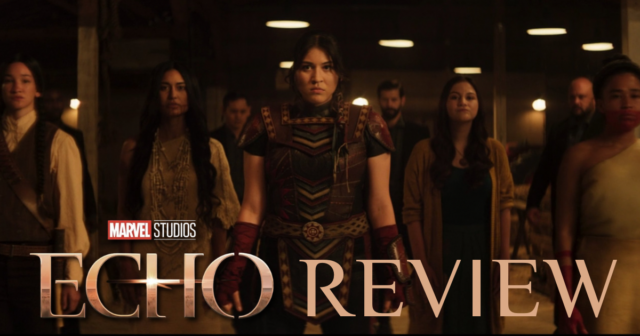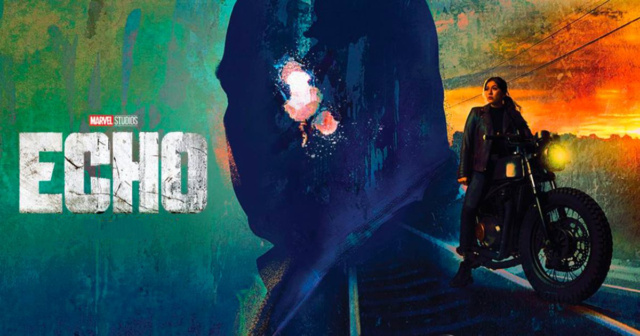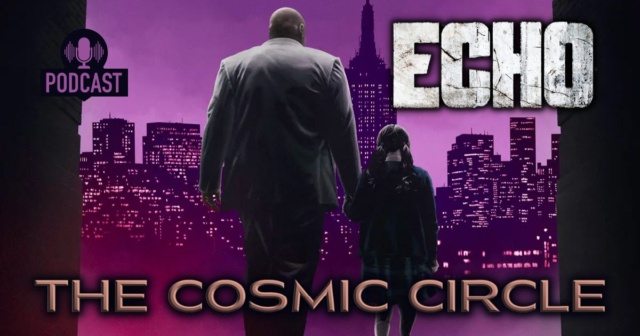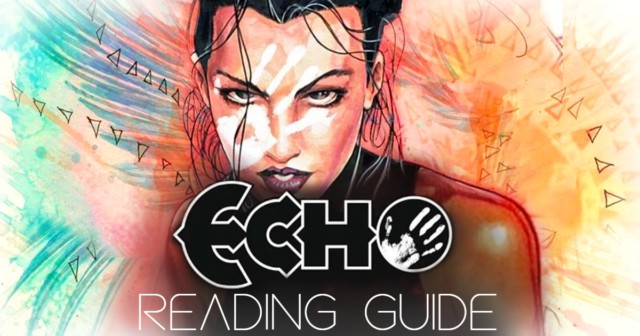Interview: Director Sydney Freeland Talks Marvel’s ‘Echo’
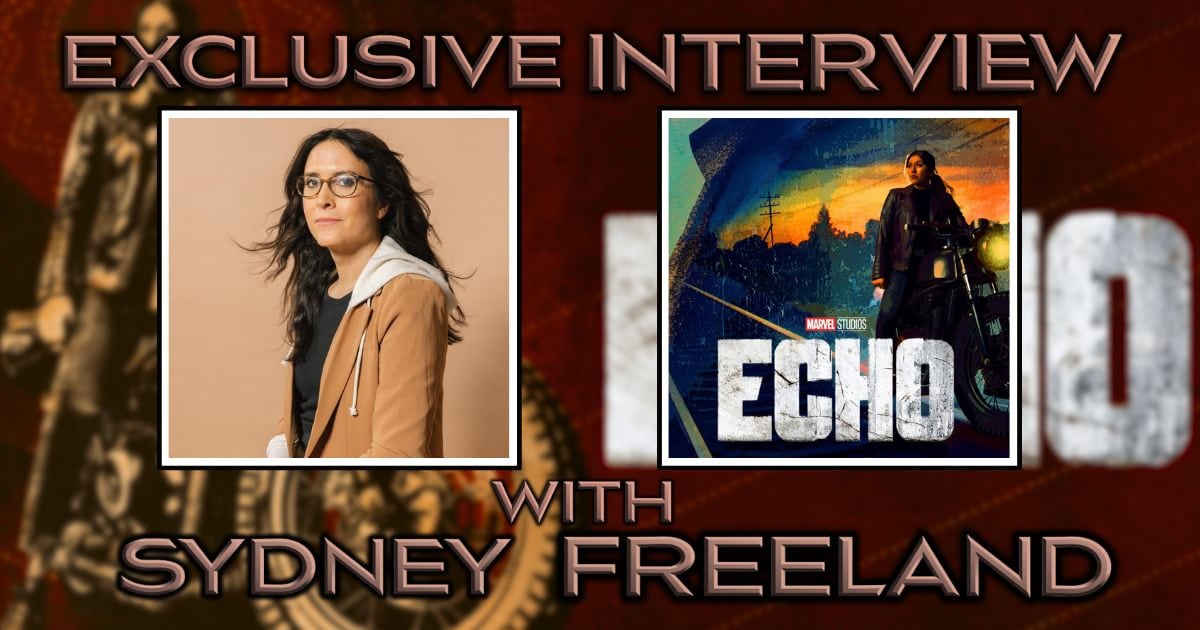
Sydney Freeland is an impressive director with an eye for detail. Not only did she direct an episode of Star Trek: Strange New Worlds, but she also lent her talents to Marvel’s Echo, helming four of the series’ five episodes along with executive producing it.
The series helped introduce viewers to the world of Maya Lopez, played by Alaqua Cox, who made her first on-screen appearance in Hawkeye. Echo broke barriers when it was released by featuring Marvel’s first deaf and Indigenous character. Unlike the usual Marvel fare, the series was grittier and had a TV-MA rating. (And ahem, an appearance by little-known Marvel character Daredevil, too.) The show pretty much immediately shot to the top of the Disney+ charts and is a massive success for the streamer.
Several weeks ago, we had the chance to sit down with Freeland over Zoom and discuss everything Maya Lopez and more. The director shared that it was the hardest and most rewarding thing she’s ever done. Freeland discussed the vision for the project, including how the heart of the series was the relationship between Maya and Kingpin, along with bringing the character home to Oklahoma. She talked about how she got on board with Echo, and it started with an e-mail from fellow directors Bert and Bertie. Read ahead for the full interview. But if you haven’t seen Echo yet, beware, there are some spoilers ahead. (And what are you waiting for, anyway?)
The interview with director of Marvel’s Echo Sydney Freeland
[Editor’s note: This interview has been lightly edited for clarity. Listen to the full audio of the interview below or find Cosmic Cafe, our interview podcast, most places podcasts are available.]
Ayla Ruby: Hi. It’s nice to meet you.
Sydney Freeland: Hi, nice to meet you.
Ayla Ruby: I’m such a fan of Echo and Strange New Worlds, so I’m really excited to talk.
Sydney Freeland: Oh, thanks. Great.
Ayla Ruby: I would love to talk about how you got onto the Echo project, your journey to it.
Sydney Freeland: Yeah, I think obviously the Echo character first appeared in the Hawkeye series, and that was Alaqua Cox, obviously phenomenal, amazing, fantastic. That was the Echo character’s MCU debut. But the character has been around since 1998. And she’s introduced in that Daredevil run of hers. The character has been around for a while and there’s a little bit of mythology built up around her.
But I think for myself personally, I was introduced to the concept in January of 2020. And I know this because it was right before the lockdown, and I got an email from Bert and Bertie, who co-directed on Hawkeye. And I remember they emailed me and said, “Hey, do you know any deaf Native American actresses?” And I just wrote back, it was like, “Nope, good luck.” And I was like, that’s very specific. And then that’s the first inkling that I became aware that they were going to bring Maya into the MCU.
And then obviously when I came on board, then Hawkeye had already aired. And the real thing was with Alaqua, was her sum total film experience was a few days on Hawkeye. To go from that to being the lead of an entire Marvel series we shot for over 90 days in Georgia. And to be number one on the call sheet is a massive responsibility, and it’s a huge undertaking even for the most seasoned actors. But I mean Alaqua just, she rose to the challenge. She rose to the challenge and then excelled beyond anybody’s wildest expectations.
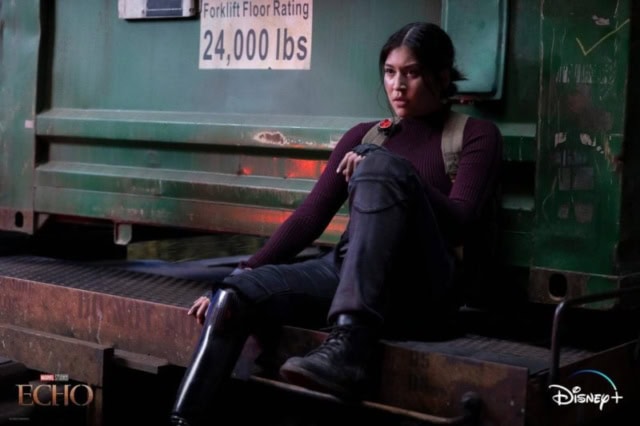
Director Sydney Freeland on Maya Lopez’s journey through Echo
Ayla Ruby: She [Alaqua Cox]was amazing. And the character is so much fun too. I’m excited about that. I want to get into the series a little bit more. Can you talk about Maya’s journey over these episodes? Where do you think she starts and where does she end up? What were the goals with all of that?
Sydney Freeland: Yeah, I think thematically, it was really about this exploration of the definition of family. We always knew when we’re crafting the series, that we knew the Kingpin, Maya relationship was going to be at the heart of the series. I mean, there were other aspects in there that were floating around, but we knew that was going to be the heart of the series. And then we also knew that she was going to go back to Oklahoma. And so, once we had those two elements, and I think what presents itself over the course of the series is that she comes in. What I love about the character and what I love about her and Hawkeye is that she was a villain. And I didn’t want to shy away from that. I wanted to lead into that. I wanted to embrace the more visceral, gritty, naturalistic elements of the character. And so that we could totally make a departure from Hawkeye.
But we come into the series, she is a villain. But thematically, she’s more New York than she is Oklahoma at that point in her life. And she has a more New York mindset and definition of family. She’s fully ingrained in that Kingpin criminal underworld. And so, her definition of family is a little more conditional. It’s very much like you scratch my back, I scratch yours. But at the same time, it can be, you can rise through the ranks, but then you can also be discarded as quickly as you’ve been elevated.
And so, I think it’s obviously she’s excelling that environment to the point of being the potential heir to Kingpin’s empire. And so, that’s where we’re coming into the series. And then over the course of it, we’re going to challenge her definition of family and introduce her to the definition of family that’s a little more unconditional, if that makes sense.
And then introduce the cultural aspects of that along with her biological family and challenge her preconceived notions so that by the end of the series, she has a different definition of what family is, or at least she’s open to a different definition of family. And so that’s really what the broad series arc was for her character. Her emotional arc and change is that, I think I would like to think that, by the end of the series, she’s still very much capable of bad things.
And so, if she starts off as a villain, I don’t want her to be Captain America. I want her to still have some grit and some… Maybe I’d like to think that her ceiling is an anti-hero. Like a Wolverine type of character, still operates on the margins. And so I think, in terms of her over the course of the series, it was really, that was her arc.
Echo Review: Alaqua Cox is the Breath of Fresh Air Marvel Needs
On grounding the project in The Choctaw Nation
Ayla Ruby: That’s awesome. Can you talk a little bit about the conversations about grounding this project in the Choctaw Nation? What the discussions were with them and how that dialogue went about? Because there’s the balance between authenticity, accuracy, it’s just so interesting.
Sydney Freeland: Yeah, yeah. Well, I think first and foremost, it was when I came on board, the character was Choctaw. One of the first things that was important for me was to engage the Choctaw Nation. And really, it was all about doing two things. One was asking their permission, which is not something that’s always done with portrayals of Indigenous peoples. And the second was to create a dialogue. And so, you can have those intentions, but then you need to have the resources to back that up.
And then, thankfully, Marvel was behind us 110%. And so we actually ended up flying all of our department heads out to Oklahoma. And we all went to… I took them to a powwow because I grew up going to powwow, so I’m trying to describe them to folks. But it was they got to see it firsthand. But more importantly, my costume designer got to see powwow outfits through her lens, my center of charge work through her lens. My AD through his lens because he’s going to have to organize the dang thing. My production designer [Chris Trujillo], so on and so forth.
But then we also got to meet with the Choctaw Nation. And we tried to be right up front with what we were doing. It’s like, “Hey, listen, this character’s a villain. She’s got the bloody violent background. But her culture and her tradition is one of the things that’s going to help her preserve her humanity in the end. That we want to embrace that. We don’t want to shy away from these aspects, but we also want to create a dialogue.”
And so, I think based off of that, they were amazing collaborators to work with. And that’s where you bring in the cultural expertise, the language expertise. We’ll focus on the story and the emotion of what we’re trying to do, but then we also want to tell things in an authentic manner. Yeah.
On the showdown with Vincent D’Onofrio’s Kingpin at the powwow
Ayla Ruby: I think I read that you pitched the moment where Maya was facing off with her family with Kingpin in the powwow. I’d love to know more about that. Can you talk about that? Either with filming because you’ve got lots of moving parts or just whatever you want to share about that.
Sydney Freeland: Oh, I don’t know if I came up with the idea. I mean, if I did, I’d be happy there. I don’t know that I can take credit for that, but I did know, I think we had… There was always that showdown in the barn. The powwow is… I mean, what I will say is that to me, the powwow was one of the two things in the series that I can genuinely say have never been seen before.
What do I mean by that? I grew up reading comic books. I grew up going to powwows, but those two things never overlapped. So that to have a finale set in the backdrop of a powwow and to have Kingpin show up there at the powwow, that to me was like, this is the reason to do this show, to have this.
And so again, it was a huge undertaking because we had to recreate this. And even something as simple as… Not as simple, it’s extremely complex, like a powwow costume, everything’s made from scratch. Everything’s custom. There’s no powwow store to go to buy regalia. It’s all made and custom. And so we had to bring people in from all over the US and Canada into Georgia to recreate a powwow from scratch. And I don’t know if I answered the question.
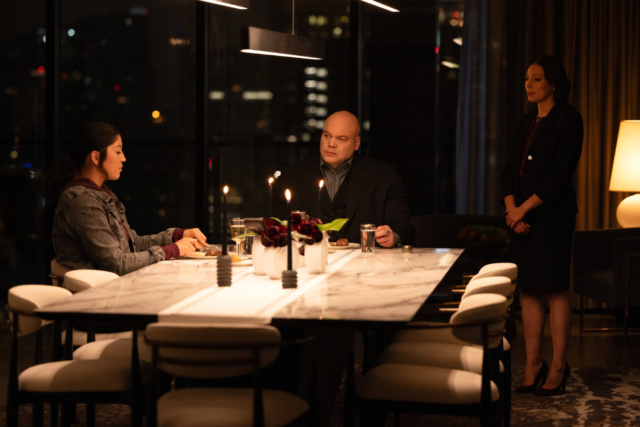
On bringing the deaf point of view to life with Echo
Ayla Ruby: Yeah. You totally have. You’re good. Also, so Maya obviously is deaf, and your lead actress is also deaf. Can you talk a little bit about bringing the deaf point of view to the screen and that vibration scape? Because it’s super interesting and well done.
Sydney Freeland: Yeah, I think it was, I went through my own learning curve. I think again, when I first came on board, yes, the cultural stuff was important, but it was also the deaf society, deaf culture, and our portrayal of that was also extremely important as well too. And so, I think for with Alaqua, we all immediately started, myself and my department heads, we all started taking ASL classes.
And for myself, it was important that I just wanted to be able to communicate with the Alaqua, even on the most basic in my kindergarten level. “Nice, again.” A ASL way. But I think it’s important for me to be able to look an actor in the eye and be able to connect emotionally in the moment on the day. And so, there were all of these great positive consequences that came out of that. In terms of just us, and also just trying to take a step towards her.
It’s I can sympathize with her being in that situation of being from a marginalized community, stepping onto a film set. And it’s very easy to feel even further apart from others. And so I think one of the things that we tried to do, create was an environment where we could all take a step towards each other. But in terms of even the ASL, one of the great things that came out of that is that as I was taking classes, as we were taking classes, my cinematographer [Kira Kelly] and I would talk and, “Well, when you sign, it’s usually here or it’s here. We don’t want to have a frame that’s like this where we can’t see all the signing.” To someone who’s deaf that’s going to be like, “Yeah, dummy. Of course, that’s a no-brainer.”
And so, I’m coming in like, “Hey, what if we had a frame like this where we could see all of the ASL?” But that led to all these conversations we got to have with each other. And then, we have the most amazing deaf resources there with us, which are people that have the lived experience. You have Alaqua, and then you have people like Doug Ridloff who is an ASL master. And he translated our scripts from English to ASL because the two languages are not one-to-one.
We got to again, create a dialogue, create a discourse, and go back and forth to hopefully tell things in a more authentic manner. But in the case of even taking ASL classes, it actually led to us changing our visual style of the show from this being a traditional close-up to this being a close-up in our show. And so for Maya, if this is a close-up, that doesn’t mean that everyone else gets more special treatment. They get this. No. This is a close-up of Maya, this is a close-up of everybody else.
Echo Review: An Intimate and Gritty Marvel Experience
Director Sydney Freeland on the challenges and successes of Echo
Ayla Ruby: Oh, that’s awesome. Can you talk about, was there anything really challenging or just super professionally gratifying that you were able to accomplish? Or besides what we’ve talked about or bring to screen or showcase that.
Sydney Freeland: It was the hardest thing I’ve ever done. This is the most difficult production I’ve ever worked on. But it was also the most rewarding. But no, I would say, I think just for myself personally, I think I went through my own learning curve, specifically just to continue on the deaf culture and the ASL, the portrayal of ASL and all that.
It was, I think going into it, admittedly, I had biases. I had preconceived notions of what I thought could and could not be possible. One being, can we have a scene that’s four or five, six minutes long between two characters where nothing is spoken? Film is a visual medium, but it’s also an audio medium. And so, can you hold the audience’s attention for that long?
And so, my DP [Kira Kelly] and I, we tried all these camera tests and everything. And I think now in hindsight, we were trying a bunch of gimmicks to try to compensate for things. But we had to go through that process to eventually evolve and arrive in where we did, which is something that is fairly traditional. It’s fairly traditional and its portrayal.
And the only difference is that this is a close-up versus this is a close-up. But the emotion is the emotion and the characters are the characters and the humanity is the humanity. Regardless of where you are or where you’re from or how you present to the world. And so at the end it’s a very simple statement, but I had to go through my own process to arrive at that. And I couldn’t be more happy with the product than the final version.
Ayla Ruby: Well, awesome. Thank you so much. I really appreciate you taking the time to talk.
Marvel’s Echo is now available to stream on Disney+ and Hulu. Have you watched this series? What did you think? Let us know on social media @mycosmiccircus or in The Cosmic Circus Discord.
Discussing Marvel’s Echo (Cosmic Circle Podcast Ep. 50) (Spoilers)

